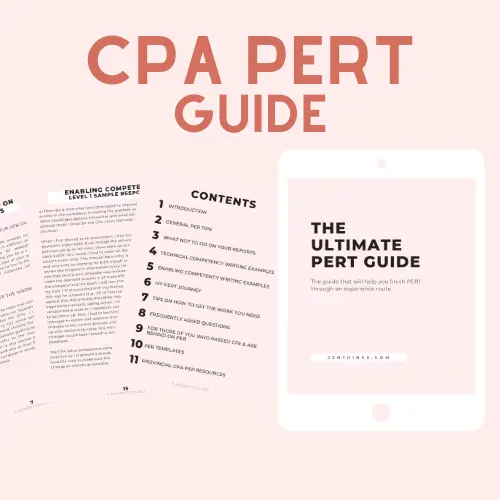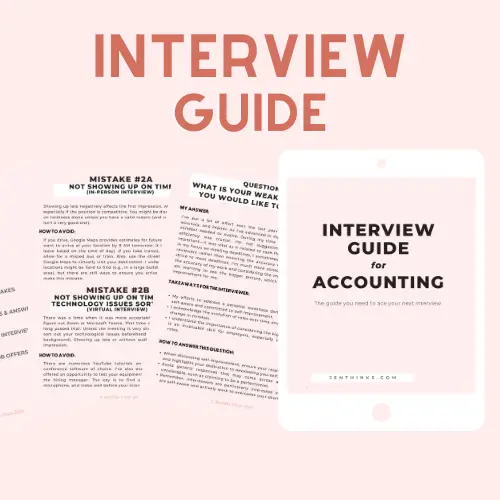Inflation, recession and interest rate hikes. If you are reading this in late 2022, you are probably a little tired of hearing the same topics over and over again. Like many others on the same boat, job security has been on the top of my mind. However, security is not the only factor that matters. To be able to make ends meet, enjoy life and also save for the future, our paychecks need to be sufficient. If you budget, you probably know this already: to make meaningful changes to your budget (e.g., rent a bigger home, buy a new car), you either increase your income or decrease your expense.
Lately, I have been thinking more about the career I have chosen. I have said this before and I will repeat this again: accounting is NOT the best paying job out there. However, it is more than possible to achieve a good work-life balance while bringing home a healthy paycheck working as an Accountant. To climb the corporate ladder as an Accountant, most people go for a professional designation like CPA (Certified Professional Accountant) or CFA (Chartered Financial Analyst). Others have success with an MBA or simply a Bachelors. But you must be wondering – exactly how much does an accountant make?
RELATED POST – Overtime in Accounting – My Experience & Thoughts
Note, the figures I am sharing in this post are from a mixture of personal experience, my network’s experience and market data in 2022. I have also only worked in the industry (instead of accounting firm) so my data will be heavily focused on industry jobs. Also, since I am from Vancouver, BC, the figures I am sharing would be most applicable here. It also does not mean there is no outlier (both on the low- and high-end). However, I strongly believe in going after what you want. If you currently make less than you desire, take action today. You either ask for more at your current job (if you are underpaid) or you ask for or move on to a better-paying opportunity.
I can anticipate some of you thinking the figures I am showing here seem high. But I am only sharing numbers I either know people who got it or someone is offering in BC. I am also looking ahead to 2023 so these would be the figures you should aim for comes annual review time. I can guarantee you there are jobs out there paying less or much less than what I am listing here. Don’t get me wrong – I have definitely been paid under market before. However, I either did not stay long once I realized that or I stayed for very specific reasons. You have to define what your reasons are because we have different priorities. Money is never going to be the only thing that matters. Also, I am assuming you are good at your job. I don’t believe in measuring performance based on the length of your work days. I believe in measuring performance based on results. If you are confident that you bring something worthwhile to the table, you deserve to be paid fairly.
All salaries are base salaries before bonus (commonly ranges from 5% to 15%).
Entry-Level: Accounts Receivable/Payable Clerk ($50,000+)
Most industry accountants get their start either as an AR/AP clerk or junior accountant. From my experience, AR/AP clerks can get paid more than junior accountants as it is generally more difficult to hire and retain competent AR/AP clerks. Job postings for junior accountants also tend to be more popular as it has the title ‘accountant’ in it hence the pool of candidates will be more. However, the difference is likely negligible in most cases.
Within AR and AP, AR also tends to get paid a bit more as the main job duty for an AR clerk is inherently more challenging. Instead of paying vendors as an AP clerk, AR clerk has to collect money from customers. Think about it – is it easier to spend money or to ask people for money? However, once again, the difference might be negligible. Even though it is not common, AR positions can sometimes be entitled to bonus for hitting collection targets.
Last but not least, a lot of CPA PEP students are also under the impression that AR/AP clerks might not be eligible for PERT. This is untrue as I started my PERT reporting as an AP clerk. However, it is true that you are unlikely to get all your Level 2’s in an operational role like AR/AP.
| Common Accounts Receivable Duties | Common Accounts Payable Duties |
| – create sales invoices – deliver sales invoices – collection emails/calls – review customer aging – customer account maintenance | – enter vendor invoices – answer vendor inquiries – set up payments – reconciliation of company credit cards – monitor recurring expenses |
At $50,000 annually, your base hourly pay is $27.21 per hour assuming you work 7.5 hours per day with 3-week vacation.
Entry-Level: Junior Accountant ($50,000+)
When I worked as a Junior Accountant, I started at $38,000 which was $20.68 per hour. Back then, the minimum wage was below $12 and you can get a one-bedroom condo in a Vancouver suburb for mid-$200K’s.
As I have already mentioned, Junior Accountants are popular first job for accounting students because it gives the impression that you can move on up from there. As a result, junior accountant job openings tend to be more competitive than AR/AP clerks. Junior accountants are also more likely to get their CPA PEP course fees fully reimbursed by their employers. However, it is not uncommon for companies to also sponsor AR/AP clerks if they decide to start CPA PEP while employed.
Often, the duties for a junior accountant are the same as an entry-level operational role like AR/AP (listed above). However, you should also expect some simple, recurring journal entries. Excel skills are an asset at this level but a basic working knowledge will be more than enough.
At $50,000 annually, your base hourly pay is $27.21 per hour assuming you work 7.5 hours per day with 3-week vacation.
Intermediate-Level: Corporate Accountant/Intermediate Accountant ($70,000+)
Usually, once they have passed one or two CPA PEP modules, it is a good time for candidates to look for a non-junior accountant title. This timeline does not apply if you don’t plan on getting the CPA designation. However, if your company pays for it, I would strongly suggest looking into it. It is not mandatory to become successful as an accountant, but I personally think it is a worthwhile investment (especially paid for by your employer) if you decide to advance your career in Finance.
As a Corporate Accountant/Intermediate Accountant, this is where one job can vary wildly from another. I have seen corporate accountants performing a mix of AP, AR and simple journal entry tasks. I have also seen corporate accountants in charge of complex financial statement consolidation. This largely depends on the size of your team and operations.
It is important to note that a CPA designation is rarely required for this level. Many job postings would clearly state that enrollment in the CPA PEP program is an asset. However, if you have the right knowledge and/or experience, you should not be deterred from applying for these job postings.
Since the job duties for corporate/intermediate accountant vary, I will not be listing their common duties. However, a suitable candidate would be expected to have a working knowledge of basic accounting principles (e.g., accrual accounting, accounting framework etc). As you likely will be assisting with annual audit, a clear understanding of what you do day-to-day will help tremedously.
Also, intermediate knowledge of Excel would be crucial as these positions will likely be responsible for various working papers. Being proficient in Excel will help set you apart from your peers.
At $70,000 annually, your base hourly pay is $38.10 per hour assuming you work 7.5 hours per day with 3-week vacation.
Senior-Level: Senior Accountant/Assistant Controller ($85,000+)
From personal experience, senior accountant/assistant controller job postings would require a CPA designation or at least nearing it (i.e., passed CFE). I am definitely not saying it’s impossible to become one without it (some people I know have made it to Controller and above without a CPA designation) but it will definitely require more connection and/or job searching.
At this level, you are expected to have a solid understanding of basic accounting principles and the accounting framework your company reports in. At a minimum, you need to know how to find the answer (which is why the CPA PEP program is value-added as you will learn how to use the accounting handbook). You will likely serve as a mentor for the more junior staffs on the team (the junior accountants and AR/AP clerks).
At $85,000 annually, your base hourly pay is $46.26 per hour assuming you work 7.5 hours per day with 3-week vacation.
Management-Level: Finance Manager/Controller ($100,000+)
Finance team with both finance manager and controller would normally have the finance manager(s) reporting to the controller. As a result, those controllers would likely get low- to mid-$100’s starting salaries in those cases (with a bigger bonus).
Not only are you expected to have a superb understanding of accounting principles and accounting framework, you are expected to manage a team of finance staff. Depending on the structure of your company, your team might consist of operational roles like AR/AP, financial reporting roles like accountants and analytics roles like financial analyst. Obviously, the more complex the structure is, the higher compensation you can expect.
As a Finance Manager or Controller, you are likely spearheading or at least overseeing the annual audit and various other audits (e.g., CRA). You will also be the go-to person for all major financial decision-making including budgeting, forecasting and investing.
These roles most likely require a CPA designation (or equivalent). Once again, there are people who made it all the way up here without one. However, strong connections and relevant working experiences are key.
At $100,000 annually, your base hourly pay is $54.42 per hour assuming you work 7.5 hours per day with 3-week vacation.


